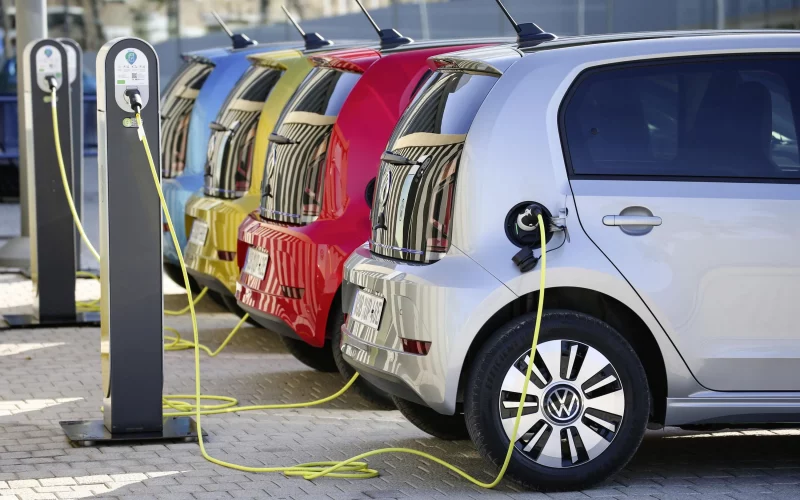Next-Generation Lithium-Ion Batteries:

The development of next-generation lithium-ion batteries has revolutionized the electric vehicle industry by significantly improving the performance and range of these vehicles. These innovative batteries have higher energy densities, allowing electric vehicles to travel longer distances on a single charge. This advancement is crucial in addressing one of the main concerns of consumers – range anxiety. With improved performance, EVs equipped with these batteries can now compete with traditional gasoline-powered vehicles in terms of range and convenience.
Improved safety features for innovative batteries in Electric Vehicles:
Safety is a top priority in the design of electric vehicle batteries, and the latest innovations have incorporated enhanced safety features to protect both the vehicle and its occupants. These next-generation lithium-ion batteries are equipped with advanced thermal management systems that prevent overheating and reduce the risk of fire. Additionally, manufacturers have implemented improved cell designs and materials to enhance the overall safety of the battery pack. These safety features provide peace of mind to consumers and help to build trust in electric vehicle technology.
Enhanced energy storage for longer range in Electric Vehicles:

Nanotechnology has played a crucial role in the development of innovative batteries for electric vehicles, particularly in improving energy storage capacity. By utilizing nanomaterials and nanostructures, researchers have been able to increase the energy density of lithium-ion batteries, allowing for longer driving ranges and improved performance. This breakthrough in battery technology has made EVs more practical and appealing to a wider range of consumers.
Improved charging speed for increased efficiency in Electric Vehicles:
In addition to enhancing energy storage capacity, nanotechnology has also improved the charging speed of electric vehicle batteries. By optimizing the electrode materials at the nanoscale level, researchers have been able to reduce charging times significantly. This increased efficiency in charging not only saves time for consumers but also helps to alleviate concerns about the availability of charging infrastructure for electric vehicles.
Enhanced Charging Infrastructure for EVs:
As the adoption of EVes continues to grow, the need for an enhanced charging infrastructure becomes increasingly important. Innovative batteries in electric vehicles have prompted the development of faster and more efficient charging stations to accommodate the increasing demand. These charging stations are equipped with advanced technology that allows for rapid charging, making it more convenient for electric vehicle owners to recharge their vehicles on the go. The expansion of charging infrastructure is essential in supporting the widespread adoption of EVs and reducing reliance on traditional fossil fuels.
Innovative batteries to enhance performance in Electric Vehicles:
The integration of innovative batteries in EVs has not only improved their range and efficiency but has also enhanced their overall performance. These next-generation batteries have higher power outputs, allowing electric vehicles to accelerate faster and deliver a smoother driving experience. By incorporating advanced battery technology, manufacturers have been able to optimize the performance of EVs, making them more competitive in the automotive market.
Safety Improvements in Battery Design:

Safety is a paramount concern in the design of electric vehicle batteries, and advancements in battery technology have led to improved fire resistance in these innovative batteries. By incorporating flame-retardant materials and advanced thermal management systems, manufacturers have significantly reduced the risk of fire in electric vehicle batteries. These safety improvements ensure the protection of both the vehicle and its occupants, giving consumers peace of mind when driving EV.
Improved thermal management systems for safer Electric Vehicles batteries:
In addition to fire resistance, innovative batteries in EV are equipped with advanced thermal management systems to regulate temperature and prevent overheating. These systems help to maintain the optimal operating conditions of the battery pack, ensuring its longevity and safety. By implementing these safety features, manufacturers have addressed one of the key concerns surrounding electric vehicle technology and have made significant strides in improving the overall safety of EV.
Government Policies Supporting Battery Innovation:
To encourage the development of innovative batteries for EV, governments around the world have implemented various incentives and funding programs to support battery research. These initiatives aim to accelerate the advancement of battery technology, increase energy storage capacity, and reduce costs associated with electric vehicle production. By providing financial support and regulatory incentives, governments are playing a crucial role in driving innovation in the electric vehicle industry.
Regulations promoting development of innovative batteries for electric vehicles:
In addition to incentives, governments have also introduced regulations and standards to promote the development of innovative batteries for electric vehicles. These regulations ensure that battery technology meets safety and performance requirements, while also encouraging manufacturers to invest in research and development. By setting clear guidelines and benchmarks for battery innovation, governments are fostering a competitive environment that pushes the boundaries of technology and drives progress in the electric vehicle industry.










